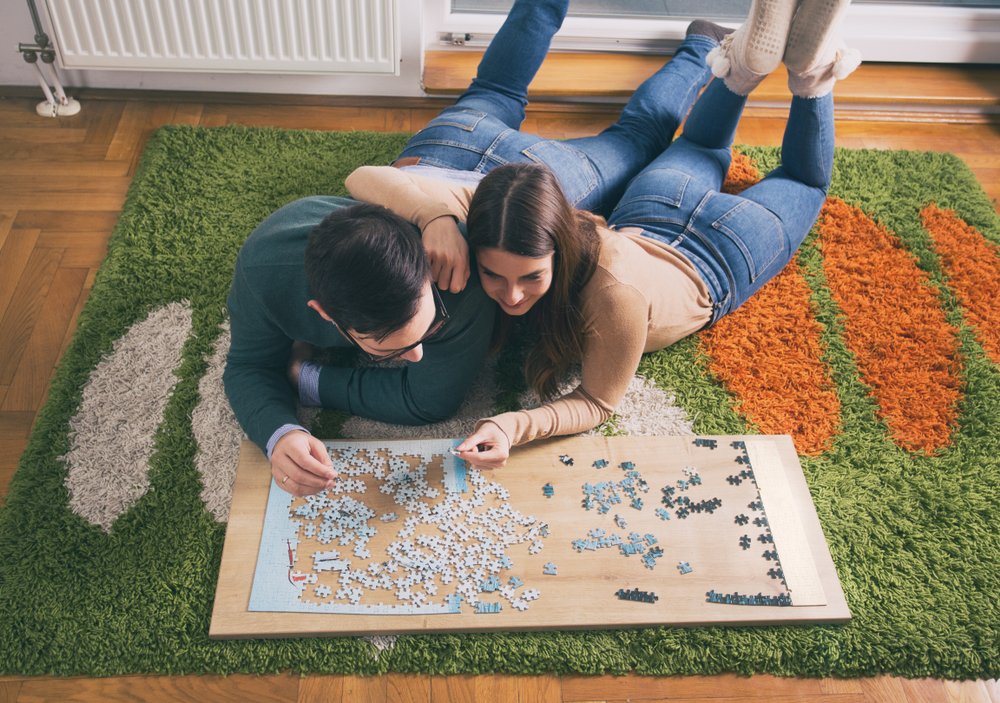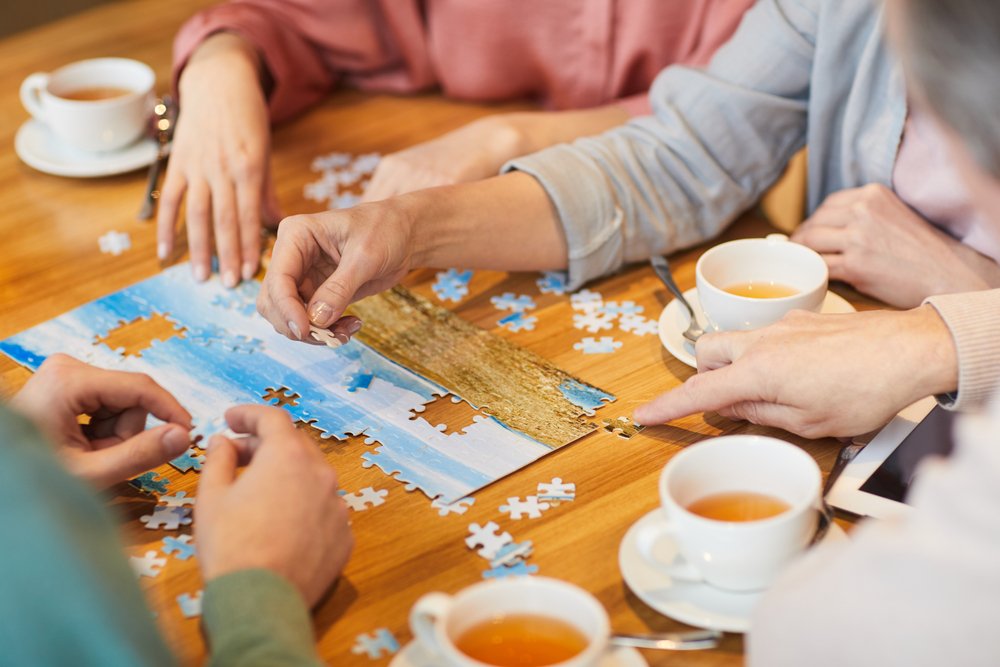Last Updated on January 25, 2024 by Gamesver Team and JC Franco

There are many people out there who just can’t control themselves when they see a jigsaw puzzle. It seems like that box full of tiny pieces is begging them to get started. Talk to any fans of jigsaw puzzles, and they will give you a long list of why they love putting those little pieces together. Below, we’ve compiled a few reasons why people are so addicted to puzzle-building.
Are you a little obsessed with jigsaw puzzles? If the jigsaw puzzle bug has bitten you, you’re not alone. However, if you are still hesitating to play it, keep reading to understand why some people just can’t stop.
15 signs you might be addicted to Jigsaw Puzzles:
1. They give you a sense of control.
The task of completing the puzzle is entirely up to you. Whether you’re doing it by yourself or with a group, there are a lot of aspects that you can control — when you do it, how much you do it, where you do it. You have the freedom to tackle the puzzle in any way you want. This feeling of control is a great way to relieve stress, so many people choose this activity for relaxation.
2. It feels like working towards something meaningful.
Jigsaw puzzles are about clear solutions with a clear goal: putting the pieces together to reveal an image. Goals drive our minds, and these puzzles satisfy your needs for accomplishing goals, even though it is just a game.
Many people can’t stop working on a puzzle until it’s completed. They will remain motivated to finish the task as they receive small doses of dopamine from believing they will achieve their goal.
3. Sense of accomplishment.
Many jigsaw fans say that there’s no better feeling than placing that very last piece and marveling at the finished image. It’s your reward for spending so much time working on it. As a result, you will want to keep moving, coming up with new goals. It might be that you finished a 1,000-piece puzzle, and now you want to try a 3,500-piece. The more challenging, the higher sense of accomplishment you will feel.
4. Jigsaw puzzles create mindful moments.
Doing puzzles require you to focus on each piece, and it forces you to be present and aware of what you are doing. By doing that, you are creating moments that take you away from your worries, and in turn, your brain will block toxic thoughts and feelings like anxiety, stress, and fear.
Jigsaw puzzles are such an absorbing task that you can spend hours on them and completely forget your troubles. As an interesting side note, meditation combines both sides of our brain in a way similar to a jigsaw puzzle.
5. Brings people together.
When you are doing a puzzle with a group of people, everyone is collaborating. That teamwork helps people bond because they are working towards a shared goal. Plus, it is fun to see people’s reactions when they find a piece they were desperately looking for.
The puzzles also promote a sense of community because the group is helping each other all the time. You know that if you all don’t contribute, it will be harder to see the finished product.
6. Breaks up the monotony.
Puzzles are great for getting your mind off boredom and introducing something new into your routine. With many sets consisting of hundreds and thousands of pieces, your task is different every time. Puzzles are dynamic. It is OK to do a bit here and a bit there, and switch sides as you wish. You do not have to complete it linearly.

7. The strategizing process.
Some people are drawn to problem-solving, and puzzles offer a lot of opportunity for that. Jigsaw puzzles provide a rare chance of being active and relax at the same time. You have hundreds of pieces scattered all over, and you need to analyze each one to find where they fit. It activates the creative side of your brain.
8. They are fun even if you do them alone.
There are a few advantages of doing jigsaw puzzles alone: you can do it at your own pace, you can get immersed in your thoughts, and enjoy some quiet time. In addition, you get a break from all the stimuli and digital life.
9. The beauty of putting pictures together.
Anyone can turn a picture into a jigsaw puzzle. Most museums sell their art pieces as jigsaw puzzles at their stores, so you can easily have a mini-exhibition at your home. The artwork options for jigsaw puzzles are endless. With each small piece, you can appreciate tiny details of the pictures you are assembling.
10. Brings up creativity.
Solving puzzles activates the creative side of your brain because you will start to become more efficient with your solutions and create strategies that will assist you in finishing them. As a result, your brain will be more conditioned to come up with inspiration and ideas to find solutions for real-life challenges.
11. It’s a treat time.
If you’re doing puzzles with friends, it’s a great way to put your conversations up-to-date and spend quality time together. The game provides an opportunity for laughs and fosters healthy relationships. You can also add a few things to make it more fun, like special snacks and music.
12. The thrill of putting the right piece in the right place.
Sometimes it takes a long time to find where the pieces fit right, so puzzle fans experience many “aha” moments. There’s a lot of excitement when you see the solution to your problem in an instant. You have probably noticed that some people are pretty verbal about that, and trust us, you will be too when you reach that eureka moment.
13. It keeps you motivated.
Puzzles provide people with little rewards throughout until you reach your utmost goal of completing the picture. Those little rewards are what keep you coming for more and don’t let you give up easily. It will help you move ahead without dreading the task, no matter how long it takes you to finish.
14. Order to chaos.

When you open the box and dump all of those tiny pieces on your table, you probably wonder where to start. It’s a complete mess. But once you find your starting piece, that mess will get more and more organized. Your brain can be calm and uplift itself slowly as you complete the puzzle, bringing order to chaos.
Another aspect of puzzles is that you can’t get it wrong. Anyone can solve a puzzle if they’re persistent and patient. Finding order with a completed puzzle hooks people on it.
15. You see constant progress.
As we mentioned above, almost anyone can solve a puzzle, no matter how challenging it is. If you persist, you will find that you leave a step closer to your goal every time you return to it. Unfortunately, progress might not be as clear with other work we do in life.
In closing
The popularity of jigsaw puzzles is on the rise. This is an opportunity to unplug and give yourself and your family a break from the overload of information that permeates our lives daily.
Although it can be nearly impossible to tear ourselves away from screens, devices, and even the television, separating ourselves from these things is crucial to our mental and physical health. Jigsaw puzzles require you to pay full attention, which is what makes them so enjoyable.

